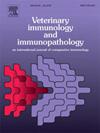gm - csf佐剂的新城疫病毒载体二价疫苗增强了鸡对新城疫和传染性法氏囊病的双重免疫。
IF 1.4
3区 农林科学
Q4 IMMUNOLOGY
引用次数: 0
摘要
传染性法氏囊病(IBD)和新城疫(ND)是危害家禽的主要传染病。尽管目前努力接种疫苗,但这两种疾病仍在世界范围内发生。我们已经开发出能够同时预防ND和IBD的二价疫苗,它不会产生突变型IBDV。以新城疫病毒(NDV)常见疫苗株克隆30为基础,利用反向遗传学技术构建了重组新城疫病毒(NDV)载体,表达了新城疫病毒(IBDV)的宿主保护免疫原VP2L和鸡粒细胞-巨噬细胞集落刺激因子(GM-CSF)。将ibdv编码的VP2L蛋白和鸡GM-CSF基因以不同形式插入NDV全长cDNA的不同位置,实现高水平表达。我们成功拯救了ND-AI双价疫苗(rClone30-VP2L(P/M)-GM-CSF(P/M)、rClone30-VP2L(NP)-GM-CSF(P/M)、rClone30-VP2L(P/M)-GM-CSF(NP)和rClone30-VP2L- ires -GM-CSF(P/M))。ND-AI二价疫苗在鸡胚中至少连续传代三次后保持遗传稳定性,并被证实表达VP2L和GM-CSF蛋白。ND-AI二价疫苗在鸡胚和细胞培养物中的复制滴度与亲本NDV菌株rClone30相当。为了评估ND-AI二价疫苗的免疫原性,将其接种给14日龄的商品雏鸡,并在接种后4周内连续监测免疫反应。接种后第10天,重组新城疫疫苗的血凝抑制(HI)抗体滴度远远超过理论保护阈值(4 log2),并在28天内保持高水平。此外,ND-AI二价疫苗中ibdv特异性抗体的水平迅速上升,并在14天内保持高滴度。同时,B细胞、CD4 + 、CD8 + T细胞的增殖反应增强,炎症因子蛋白表达水平和mRNA转录水平显著升高。总之,ND- ai二价疫苗可刺激机体产生更强的免疫反应,显示其作为IBD和ND疫苗的潜力。此外,GM-CSF的加入可以进一步增强免疫应答。本文章由计算机程序翻译,如有差异,请以英文原文为准。
GM-CSF-adjuvanted Newcastle disease virus-vectored bivalent vaccine elicits enhanced dual immunity against Newcastle disease and infectious bursal disease in chickens
Infectious bursal disease (IBD) and Newcastle disease (ND) are major infectious diseases that endanger poultry. Despite current vaccination efforts, both diseases still occur worldwide. We have developed bivalent vaccines capable of simultaneously preventing ND and IBD, which does not produce mutant IBDV. Using reverse genetics, we constructed a recombinant Newcastle disease virus (NDV) vector based on the common vaccine strain Clone30 to express the host-protective immunogen VP2L of the IBDV strain and chicken granulocyte-macrophage colony-stimulating factor (GM-CSF). The IBDV-encoded VP2L protein and chicken GM-CSF gene were inserted into different positions of the NDV full-length cDNA in various forms to achieve high-level expression. We successfully rescued the ND-AI bivalent vaccines (rClone30-VP2L(P/M)-GM-CSF(P/M), rClone30-VP2L(NP)-GM-CSF(P/M), rClone30-VP2L(P/M)-GM-CSF(NP) and rClone30-VP2L-IRES-GM-CSF(P/M)). The ND-AI bivalent vaccines maintained genetic stability after at least three consecutive passages in chicken embryos and was confirmed to express VP2L and GM-CSF proteins. The replication titers of the ND-AI bivalent vaccines in chicken embryos and cell cultures were comparable to those of the parental NDV strain rClone30. To assess the immunogenicity of the ND-AI bivalent vaccines, it was administered to 14-day-old commercial chicken chicks, and immune responses were continuously monitored for four weeks post-vaccination. By day 10 post-vaccination, the hemagglutination inhibition (HI) antibody titers of the recombinant NDV vaccine had far exceeded the theoretical protective threshold (4 log2) and remained at high levels for 28 days. Additionally, the levels of IBDV-specific antibodies in the ND-AI bivalent vaccines rapidly increased and remained at high titers for 14 days. Concurrently, the proliferation responses of B cells, CD4 + , and CD8 + T cells were enhanced, and the protein expression levels and mRNA transcription levels of inflammatory factors significantly increased. In summary, the ND-AI bivalent vaccines can stimulate the body to produce a stronger immune response, demonstrating its potential as a vaccine for IBD and ND. Additionally, the addition of GM-CSF can further enhance the immune response.
求助全文
通过发布文献求助,成功后即可免费获取论文全文。
去求助
来源期刊
CiteScore
3.40
自引率
5.60%
发文量
79
审稿时长
70 days
期刊介绍:
The journal reports basic, comparative and clinical immunology as they pertain to the animal species designated here: livestock, poultry, and fish species that are major food animals and companion animals such as cats, dogs, horses and camels, and wildlife species that act as reservoirs for food, companion or human infectious diseases, or as models for human disease.
Rodent models of infectious diseases that are of importance in the animal species indicated above,when the disease requires a level of containment that is not readily available for larger animal experimentation (ABSL3), will be considered. Papers on rabbits, lizards, guinea pigs, badgers, armadillos, elephants, antelope, and buffalo will be reviewed if the research advances our fundamental understanding of immunology, or if they act as a reservoir of infectious disease for the primary animal species designated above, or for humans. Manuscripts employing other species will be reviewed if justified as fitting into the categories above.
The following topics are appropriate: biology of cells and mechanisms of the immune system, immunochemistry, immunodeficiencies, immunodiagnosis, immunogenetics, immunopathology, immunology of infectious disease and tumors, immunoprophylaxis including vaccine development and delivery, immunological aspects of pregnancy including passive immunity, autoimmuity, neuroimmunology, and transplanatation immunology. Manuscripts that describe new genes and development of tools such as monoclonal antibodies are also of interest when part of a larger biological study. Studies employing extracts or constituents (plant extracts, feed additives or microbiome) must be sufficiently defined to be reproduced in other laboratories and also provide evidence for possible mechanisms and not simply show an effect on the immune system.

 求助内容:
求助内容: 应助结果提醒方式:
应助结果提醒方式:


